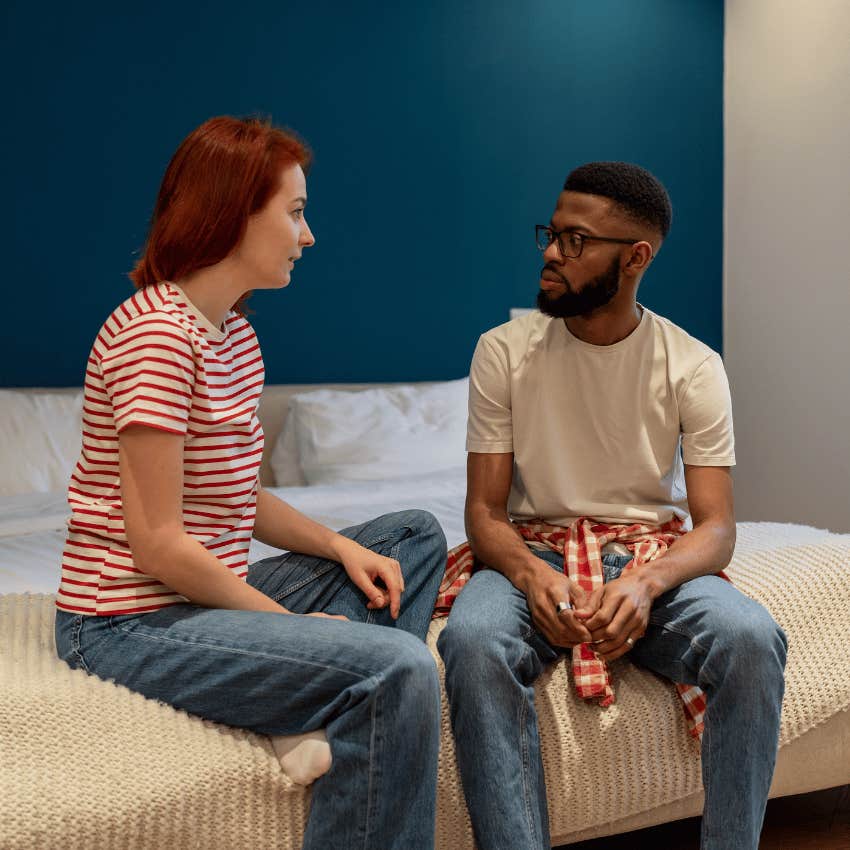When Someone Speaks Of Their Pain, Listen Closely
The subtle art of supporting without words.
 Karolina Kaboompics | Canva
Karolina Kaboompics | Canva I stared into his eyes for two seconds, glanced at the surrounding crowd, looked down at my skinny fingers as I placed them with frustration on the cold café table, and whispered, “Sure.” Then I turned my back and walked away.
It wasn’t a conversation I wanted to continue. I was mentally overused, emotionally overwhelmed, and spiritually overburdened. Somehow, nothing seemed to work. No matter how much I tried to create an emphatic space where my friend and I could connect without the interference of cold logic and harsh judgment, I couldn’t make him realize that I needed him to stay quiet and listen without interruption, even for five minutes.
Maybe my feelings were too much for him to handle. Perhaps I wasn’t as mentally tough as I used to be to him. Or maybe my words were too heavy, and they overwhelmed him. I don’t know. Maybe I sounded too desperate, and he felt the need to motivate and push me forward.
Whatever the reason, at that moment, I felt unheard and alone. All I wanted was to talk to someone, anyone but myself.
I was tired of hearing my own thoughts echo endlessly, shouting inside my head, searching for a way out. I trusted my friend, whom I had known for a decade, to be patient and allow me to vent my pain. But my friend was trying to turn me into a version of himself while he stood there, emotionally untouched. I don’t blame him.
I used to be worse at listening to those in pain. I often rushed to solutions and left them feeling more isolated. But now, as I reflect on my life and how it felt when I was on the other side, struggling to find someone who cared enough and made me feel heard, I see things with a much broader perspective and deeper view.
 Pheelings media | Shutterstock
Pheelings media | Shutterstock
Seven years ago, I was in the midst of my deepest depression. I wasn’t just sad — I felt profoundly alone, even when surrounded by “some” people.
Life was closing in tighter than ever, and I couldn’t see a way out. The biggest blow was losing my job — my primary source of income. From there, everything unraveled. I lost 90% of my social life, became isolated, and felt completely disconnected. I was stuck in a city where money ruled everything, even the simplest form of friendships.
But it wasn’t just the loss of my job or the sense of failure that sent me into depression. It was the feeling that I had tried everything mentally, emotionally, and spiritually and couldn't find a way out. I drained every last resource I had, yet still, I wasn’t able to solve my life struggle. It wasn’t entirely that I didn’t know what to do, but somehow, I was numb in pain that I couldn’t find purpose or meaning to make a difference in my life.
Back then, all I wanted from my friends or even a single friend was for them to sit with me in that emotional space without trying to drag me into their position or their concept of happiness.
I didn’t need practical advice to tell me to “be strong” or “find another job” without understanding my circumstances. I just needed my friend to listen and let me express my frustration. To acknowledge that, yes, my pain was real and wasn’t a delusional or some mental illness.
I needed to understand myself better and heal myself through shouting the noise inside my head out, not through a life lesson. I didn’t need others to solve my pain; I was in a mess and wasn’t expecting someone to rescue me. I just needed someone to sit with me at the same table with a simple smile without judgment.
Being depressed isn’t something you can talk someone out of. Most of the time, people are not asking for feedback or advice when they open up about their feelings. I wasn’t looking for someone to say, “This is life, and you just have to deal with it,” or “You’re not the only one who feels this way.”
It’s not a problem you can solve with a few motivational words. We first live in layers of emotional pain, and we can’t move to the layers of physical action and spiritual change unless we can heal our hearts first.
Most people who are suffering already know the solutions. They don’t need answers; they need someone to hold their pain for a moment. Without feeling understood, they can’t begin to heal.
I admit, on many occasions, I, too, jumped to conclusions, offering practical suggestions. But the response was always an “um” or a “hmm,” and then they’d fade from the conversation. I had lost them.
 DimaBerlin | Shutterstock
DimaBerlin | Shutterstock
Listening to people has taught me that whenever the other person in pain starts becoming resistant during a conversation, it’s a signal to pause and simply listen.
Most people need an outlet to vent about the challenges they are dealing with in life, and knowing you have someone you can turn to in times of trouble can be comforting. But sometimes, one person does all the comforting while the other does all the venting. Displaying empathy and compassion for others is not a bad thing.
However, it could get a little overwhelming if you find that you are always the shoulder to cry on. If your friend doesn't reciprocate by being there for you, it can quickly weigh you down mentally, emotionally, and sometimes even physically.
Emotional draining can leave you feeling like you are shouldering another person's problems and absorbing their stress. These mentally draining situations will eventually wear you out.
I understand that sometimes, listening to someone’s pain can be emotionally draining. Some people carry a heavy bag of negative emotions and a pessimistic view of life that can easily affect the listener's energy. However, that doesn’t mean we can’t manage the conversations better.
When someone confides in us, they’re not just looking for answers. They’re looking for an emotional connection with someone they trust. As a listener, I’ve come to honor the trust of being chosen to listen. Even if I can’t fix their problem, I can offer my presence and a listening ear, honoring their trust and showing that their feelings are valid and heard.
I have learned that my friend and I made the same big mistake of offering quick, logical responses to emotional struggles, either to escape the conversation or because we felt insecure about not having the right answers. However, my experience with depression taught me that it’s not about what you say or how long you sit with someone but how deeply you listen. Ten minutes of undivided attention and deep listening can do more good than giving two hours of non-stop advice.
The realization became even clearer when I found someone who could sit with me in my pain, not to fix it, but to truly understand it. It was only with a friend who was experiencing depression at the same time as I was that I enjoyed those deep conversations and began to heal myself. When I said, “I can’t breathe,” he’d reply, “I get you; it will pass.” He wasn’t weak or seeking a quick fix, nor was I. He was simply saying that he had the same shared feeling and could understand the weight of the pressure.
During that period, I realized that I’ve also learned to listen to myself when listening to others. Pain is a teacher. And by sitting with others in their emotional space, I’ve come to understand my pain better. Sometimes, I even feel what they feel.
Only then, when I truly empathize, can I offer anything useful and ask for something effective for my situation. Sometimes, we fear helping others in pain. We think they’ll want something we can’t give now: time, money, or immediate solutions.
 My July | Shutterstock
My July | Shutterstock
But most people in pain don’t need solutions. They need something much simpler: a sense of being heard and understood.
Pain often disconnects us from our lives, isolates us from the world, and detaches us from our sense of worth. When we take the time to listen truly, we help someone begin to rebuild that connection. You tell them that their existence matters and that they’re not invisible in this world.
We can all be that kind of person for someone. It doesn’t require grand gestures or hours of your time. Sometimes, it’s the smallest act: giving a gentle smile, asking a thoughtful question about their feelings, or even giving a simple acknowledgment like, “I hear you.”
These moments of empathy allow someone struggling to manage their steps and find their way to healing. And when we are there for someone, we sometimes find ourselves healing, too.
Feeling overwhelmed or too busy to sit with someone else’s pain is easy in our fast-paced lives. But the reality is that everyone, at some point, feels lost, isolated, or unseen. We all experience pain and need moments when someone truly listens to us. Whether you’re on the giving or receiving end, we all need empathy as a shared humanity.
We all need to vent from time to time, but when it’s done to the point of exhaustion or without understanding others’ boundaries, we risk harming the people we rely on to support us. A 2022 study shows that social support significantly decreases loneliness, and a healthy support system can go a long way. Supportive relationships should involve a balance of sharing and actively listening. If you’re leaning on your loved ones, it’s just as necessary to check in on them and ensure they have the space to listen to you.
If my experience with depression has taught me one thing, it’s that helping one person feel seen, heard, and acknowledged is a lot more powerful than offering a thousand empty words to the world.
Real listening doesn’t require fixing people; it requires being with them at the same level as their emotions. We aren’t meant to be mechanics for one another’s pain. We can’t just patch up people with quick solutions. We’re human, and by being a part of humanity, we show up with patience, generosity, and an open heart, even when we don’t have answers.
The next time someone reaches out, remember: you don’t have to say everything; sometimes, you don’t have to say anything. Just be fully present. In those quiet moments of connection, you might not just be helping them recover but also healing yourself from pains you never knew existed.
Nour Boustani is a personal development coach and expert writer specializing in self-acceptance, compassion, life lessons, and personal growth. His passion for human psychology, real-life experiences, and philosophy has enriched his work, contributing to both his personal growth and the depth of his articles, which focus on helping individuals navigate personal development and emotional healing.

